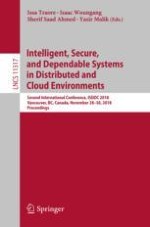2018 | OriginalPaper | Buchkapitel
Automating Incident Classification Using Sentiment Analysis and Machine Learning
verfasst von : Marina Danchovsky Ibrishimova, Kin Fun Li
Erschienen in: Intelligent, Secure, and Dependable Systems in Distributed and Cloud Environments
Aktivieren Sie unsere intelligente Suche, um passende Fachinhalte oder Patente zu finden.
Wählen Sie Textabschnitte aus um mit Künstlicher Intelligenz passenden Patente zu finden. powered by
Markieren Sie Textabschnitte, um KI-gestützt weitere passende Inhalte zu finden. powered by
